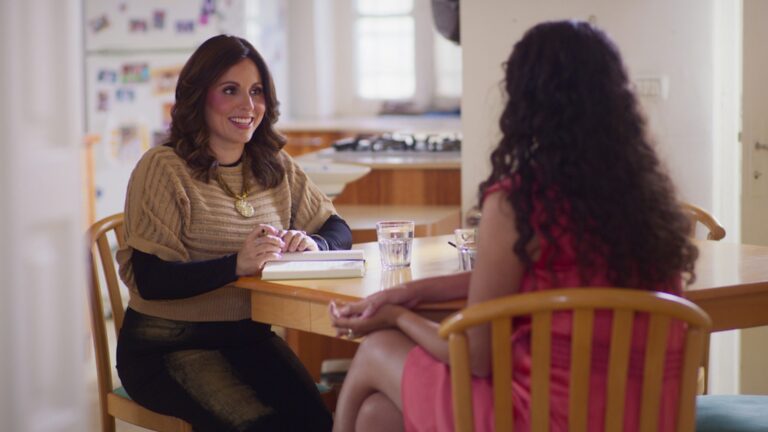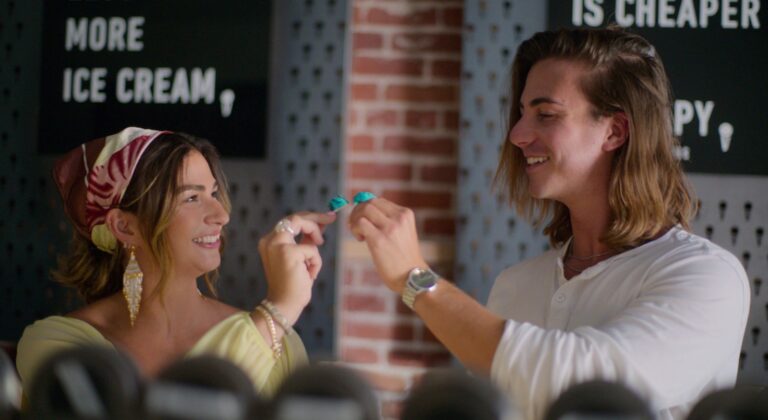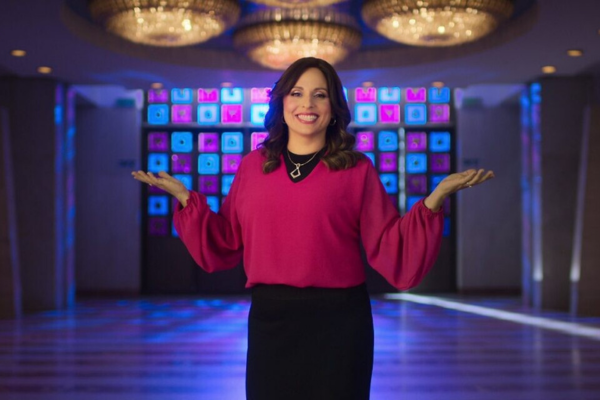Aleeza Ben Shalom is a mother of five from a small town in northern Israel. She’s also the star of one of the most talked about Netflix shows.
By Yulia Karra, ISRAEL21c
Even if you’ve never watched “Jewish Matchmaking” on Netflix, there is a very slim chance you’ve never heard of it.
The show follows a group of Jewish singles tired of dating apps who turn to a traditional matchmaker to help them find true love.
Aleeza Ben Shalom, the matchmaker in real life and on the show, is undoubtedly what made it such a hit.
Overnight celebrity
Speaking to Ben Shalom in person, you can’t help but wonder how someone even has this amount of charisma. Her infectious laugh seems as genuine in real life as it does on the Netflix program, and her sincerity makes it clear that fame is something entirely new to her.
“For now I am enjoying it,” she tells ISRAEL21c. “People are coming up to me and giving me blessings. Women are giving me hugs and telling me how meaningful [the show] is for them. I’ve had children telling me, ‘I love your show,’ … and parents and grandparents. People are so excited and I just go with it. I imagine it will get old at some point, but it’s not old yet.”

Nevertheless, she is happy that she lives in the small town of Pardes Hanna-Karkur in northern Israel and not in Tel Aviv or Jerusalem, where it’s difficult to walk down the street without someone recognizing her. But even in her hometown, she encounters fans from time to time.
“The other day I went to Superpharm to pick something up, and somebody looked over at me and did a double take. As I walked out of the store, she was there, like: ‘You’re Aleeza? Can you send a birthday message to my friend? Can we do a video?’ I say ‘Sure, sure.’ And the whole time I’m praying I understand everything she’s saying to me in Hebrew,” she laughs.
Matched by a matchmaker with Netflix
So, how does an Israeli American from Pardes Hanna get a Netflix deal?
The casting company interviewed Ben Shalom multiple times before she landed the job.
Netflix decided to split the storyline between Israel and the United States. The cinematography affords viewers magnificent perspectives on Tel Aviv and Jerusalem. “It looks so beautiful. They did such a good job,” she says.
“I think people got to see the real side of Israel and of Israelis. I thought that it was very lighthearted and fun and entertaining,” she says of the season’s eight episodes.
“It gave a quick look into different types of Jews that are here as well. It wasn’t a show about one type of Jewish person; it showed a variety and I thought that was so incredible. A blessing.”

Can we expect a second season of “Jewish Matchmaking?”
“God willing there will be,” Ben Shalom says. “We’re waiting for all the numbers to come in. If there are enough people watching, then we’ll be back for season two.”
Happy to be home
Pardes Hanna-Karkur is a hipster town where the Ben Shalom family enjoys “wonderful friends, a gorgeous community” and relative proximity to Tel Aviv and Jerusalem — where many matchmaking clients come from.
Over the course of the interview, the Philadelphia native mentions her struggles with the Hebrew language (“Hebrew is our greatest challenge; for anyone looking to move here, learn Hebrew!”) since moving to Israel two years ago with her husband, five kids — aged 19, 18, 13, 11 and nine — and a dog.
“My 11- and 13-year-olds are having the hardest time with Hebrew because my husband and I don’t speak Hebrew fluently; we don’t have Israeli parents. The nine-year-old, however, just runs around saying ‘ken’ [Hebrew for yes] to everyone. He says, ‘Just say ken, it works.’”
Despite the language barrier, Aleeza says she is “so happy” to be living in Israel.
“I have been waiting to move here since I was 17. I’ve traveled, I’ve visited, I’ve done programs here. When I came here for the very first time at 17, I didn’t know anybody, I didn’t have any family here, I just fell in love. I felt very deeply connected and always wanted to come back.”
For the past few months she has been shuttling a lot between Israel and the United States because of the show. “Every time I leave, I say to myself, ‘It’s okay, you live here, you’re gonna come back, don’t worry.’ And every time I come back I’m crying, like I can’t believe I live here. I’m happy I’m home.”
In addition, the Ben Shalom family doesn’t miss the rainy Philadelphia weather. “Blue skies, sunshine and no rain for seven months [out of the year] make me very happy.”
Matchmaking in Israel vs. US
Ben Shalom says she notices differences between American and Israeli singles. “I think Israelis are more mature than Americans and they grow up faster,” she says.
“At 18, they go into the army, they are seeing life and death, they are fighting for their country and are taught how to deal with terrorists. In America, we go to college and get a car. We’re not challenged to the core of who we are in the same way that you are in Israel.”
She adds that “Israelis are grounded and rooted in family. In America, if you want to get married, they tell you to get stable first — get a job, get a house. In Israel, if you’re still in school and want to get married, nobody cares because Israelis are coming from a marriage-minded society.”
She says that despite Americans being cautious about entering a marriage union, doing so at a progressively later age, the divorce there is still higher than in Israel, and starting a family there is much more difficult.
“Matchmaking is challenging in general, but the older that we are, the more life experiences we have, the more [factors] we have to combine when we try to meet somebody else. If you’re 40, getting married for the first time, you have a routine and you’re not used to having somebody else in your life.”
In addition, in Israel young adults live at home with parents for much longer than their US counterparts, who tend to move out at 18.
“How do you build a family if you’ve never had it outside of that time before you were 18?”
With a flourishing TV career, matchmaking business and five kids, I wondered aloud if Ben Shalom has time to sleep.
“No!” she exclaims. “Last night I went to bed early and I think it was 4:30am. But I do take naps and lots of vitamins,” she laughs.
